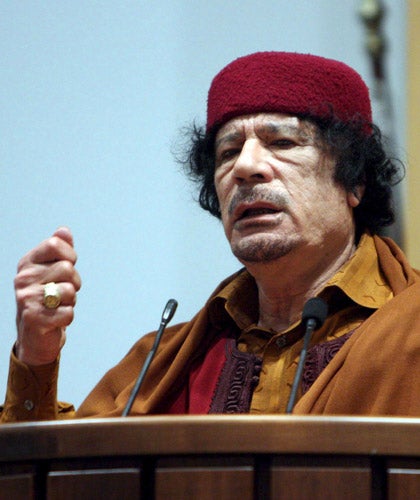Boyd Tonkin: The writer who said no to Libyan loot
The Week In Books

Anyone who distrusts cost-free moral outrage and has no duty to secure the future energy needs of a crowded island will think twice about pillorying politicians who do backstairs deals with resource-rich tyrants. Now as ever, diplomacy means dirty hands. For that reason, since the age of Milton in Britain or Voltaire in France, writers have claimed and won a role as voices of conscience who can exercise the freedom – and even responsibility – to stand up to unjust power. How heartening, then, to learn about a leading literary figure who has had the steadfastness to say "no" to a tempting accommodation with Colonel Gaddafi and the Libyan autocrat's vile-as-ever regime.
Juan Goytisolo is not always the most comfortable or approachable of writers. Born in Barcelona in 1931, brought up under Franco's airless, brainless dictatorship, he became both a political and a literary rebel. From exile in Paris, he flouted every convention of faith, family and state in fascist and Catholic Spain. Gay sexuality sharpened his scorn for orthodoxy of every stripe - although he was happily married for many years. A growing sympathy with Muslim culture – rather than religion as such – crystallised his discontent with Europe's legacy.
Dalkey Archive Press has just issued a revised edition (translated by Peter Bush) of Juan the Landless, part of the path-breaking trio of books – along with Count Julian and Marks of Identity – that defined this heretic's rejection of his stifling origins. Since his wife's death in 1996, Goytisolo has mostly lived in Marrakech, immersed in the Arab customs and traditions that became his second, preferred homeland. Cinema Eden, a collection of his essays published by Eland Books, captures all his undimmed delight and fascination with the Moroccan scene around him.
Last month, this stalwart friend and champion of Muslim civilisation was sounded out to see if he would accept an International Prize for Literature awarded by an eminent panel of Arab jurors. Its value would be 150,000 euros. Goytisolo esteemed the judges – who included the excellent Libyan novelist Ibrahim al Koni – but found himself having to confront "a very big but". The prize money came from the Libyan state. So he refused.
As he wrote in El Pais, "Precisely out of respect for the Arab people, I have always criticised the theocracies and republican dynasties that rule them and keep them in poverty and ignorance". This supremely candid friend consistently tells home truths about what he calls "the corruption of ruling elites, dictatorships holding on to power indefinitely, the repeated electoral farces in almost all states of the Arab League". Since a long and uncompromising career devoted to avant-garde fiction and radical criticism seldom earns a fortune, I imagine that the withdrawal represented a real choice, and a real challenge, on Goytisolo's part. We should salute him for it.
On this treacherous terrain, absolutist stances seldom do favours to the prize refusenik. Literary awards with official blessing now make a big noise in the Arab world, and they have begun to do some vital work. Bahaa Taher's Sunset Oasis (see review on page 29) would not now be in English from a major publisher if it had not won the inaugural "Arab Booker". Also run from Abu Dhabi, the literature prize in the annual Sheikh Zayed Awards this year went to the courageous veteran Egyptian dissident, Ghamal al Ghitani.
When such contests aim to reward independent creativity and enrich civil society – and, heaven knows, nothing could be more essential around the Arab lands – then blanket boycotts do nobody any good. But, with a state such as Gaddafi's desert despotism and a life-long reputation for integrity such as Goytisolo's, the time does sometimes come to decline the handshake, the podium and the cheque. To resuscitate the old cliché, he has shown when and where to draw a line in the sand.
P.S.I checked out the guidebook shelves in WH Smith travel shops after the monopolistic fix that saw Penguin strike an exclusive deal with the chain. They look Stalinist - rows of Rough Guides or DK Eyewitness titles, with nothing to break the monotony. Now the misnamed Office of Fair Trading has lived down to its jellyfish reputation. It has told the British Guild of Travel Writers, which objected, that Penguin's stitch-up with the group that has a virtual stranglehold on airport and station bookselling is not worthy of its precious time. Quite pathetic. Remember Harry Enfield's witless DJs Smashie and Nicey, bleating that in multi-party elections "you can have too much choice"? Do Penguin's competition-strangling capos John Makinson and Tom Weldon want to become the Smashie and Nicey of UK publishing?
Join our commenting forum
Join thought-provoking conversations, follow other Independent readers and see their replies
Comments
Bookmark popover
Removed from bookmarks